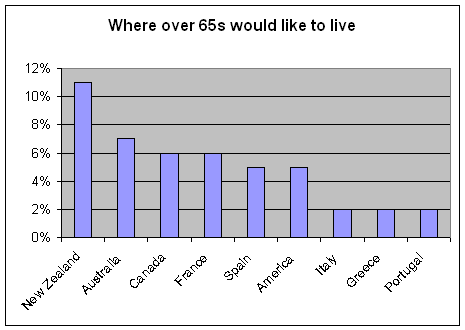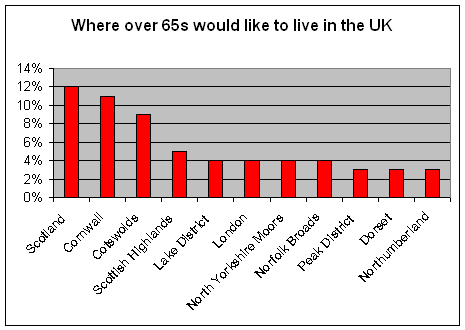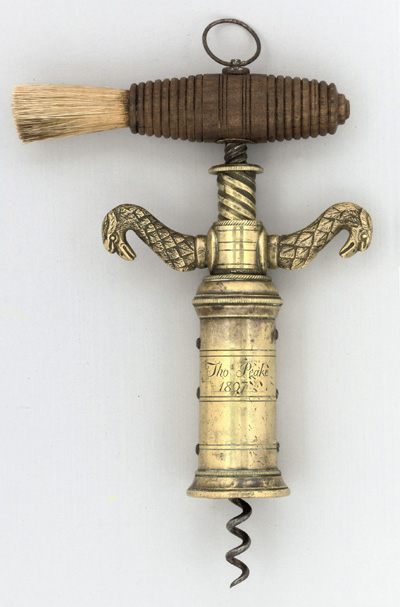

Last year the Institute for Public Policy Research found that 5.5 million British born people lived permanently in other countries. And this summer National Statistics revealed that in 2006 385,000 people left Britain to live abroad, the highest number since 1991.
Despite this, most older people would prefer to live in the UK. And the wide open spaces beat towns and cities hands down. Only London, at 5th, even appears in the top ten. Scotland, Cornwall and the Cotswolds head the table and every other area in the top ten is distinctly rural.


In June the Lords voted by a majority of 55 to push through amendments to the Government’s Pensions Bill which would have increased the compensation paid to people whose pension scheme collapsed before April 2005 from 80% to 90% of their basic entitlement. The amendments would also have raised the amount paid by 2.5% a year to help with inflation and allowed those affected to claim their pension earlier than 65.
The House of Commons rejected these changes in July. Normally they would then go back to the Lords for further debate. But when it seemed likely that peers would once more push through their amendments, the Government prevented them by invoking the traditional privilege of the Commons to decide all matters relating to public spending. So the rescue plan was lost. Instead, the Government agreed to raise the compensation ‘towards 90%’ and promises more details later this year.The banks estimate there is between £350 million and £500 million in forgotten accounts and are busy trying to reunite people with their money. You can enquire or find out more from the British Banker’s Association www.bba.org.uk or call 020 7216 8909 or the Building Societies Association www.bsa.org.uk or call 020 7437 0655.
There is also £435 sitting in National Savings accounts – and a similar amount in expired certificates and unclaimed premium bond prizes. That money will not be taken into the new scheme. If you think you or a relative may have forgotten National Savings products, contact its tracing service by calling 0845 964 5000 or go to www.nsandi.com/help/tracing_service.jsp
Switching problems
Consumers who switch gas or electricity supplier will no longer
be free to switch again after 28 days. The rule was a key part of encouraging
competition among suppliers. But the energy regulator Ofgem decided to scrap it
in August despite opposition from consumer groups such as Energywatch and
several energy suppliers.
Without the 28 day rule energy companies will be free to tie in new customers to prevent them moving again to a cheaper rival. So they could lock customers into contracts for a long period and then raise charges. Customers could be forced to pay a financial penalty if they want to leave before the contract period ended. Energywatch told Ofgem that if it scrapped the rule suppliers would "tie consumers into a…contract that will require considerably more than a 28-day notice period."
The change was also opposed by several of the energy supply companies. ScottishPower said the removal of the 28 day rule "will have potentially negative implications for competition". Only three suppliers actively supported it.But Ofgem ignored these objections and said suppliers "should be free to develop innovative contracts". It is still worth switching supplier. But make sure when you sign up that you can switch again without penalty in 28 days.
Bank deal sinks claims
People who have not yet claimed back their overdraft charges
could have to wait years to get them refunded. The banks have done a deal with
financial regulators which allows them to put all new claims for overdraft
refunds in the pending tray until the courts have decided how much the banks can
legally charge customers who go into the red without permission. In some cases
people can be charged £35 for going a penny overdrawn. Charges can then mount up
leaving people owing hundreds of pounds in fees for a single mistake.
Anyone who has not yet reclaimed their overdraft fees should still put the claim in. It will be registered and put on hold until the court case is finally settled.
Passport woeThe idea developed out of a scheme to allow veterans of World War II to return to old battlefields or revisit places or people they last saw in the 1940s. But in 2004 it was extended so that anyone who was at least ten years old when that war began is eligible for a free full passport. The scheme was announced three years ago (see Saga Magazine December 2004). But the Government is concerned that many older people do not know about it. Barely one in ten of the four million who could be eligible have applied.
To apply use the normal form but do not pay the £72 fee. If it has been paid by mistake since 19 May 2004 it can be claimed back. Passport forms are available from Post Offices. If you ask them to check the form they will still charge £6.By the end of the year anyone applying for a passport for the first time will have to have a compulsory face to face interview with at one of the 69 new interview offices. The Home Office claims 95% of the population will be less than an hour away. More at www.passport.gov.uk or call the Identity and Passport Adviceline on 0870 521 0410.
What a corker!
Dennis Cox, corkscrew specialist in the Silver department at London Auction house Christie’s says the market for rare items is strong.
"It probably peaked about ten years ago. But collectors still want rarities – a rare patent or registered design, usually they have some sort of mechanical device. If they didn’t work terribly well they might be rarer because not many were made. But collectors have been a bit overwhelmed by the quantities of mass produced items."It was a vicar, Samuel Henshall, who first patented a corkscrew in 1795. His big idea was a button at the top of the spiral which pushed and turned the cork, breaking the seal and making it easier to withdraw. His design was produced for more than 100 years often incorporating a brush or a knife in the handle. Seven years later Sir Edward Thomason patented an even cleverer device, still in production today, which screws into the cork and then draws it out as you keep turning in the same direction. Finding a corkscrew with a patent number definitely means cash – a maker’s or vendor’s name means more. Some can be worth £1000 or more. The record was £18,400 set in 1994 for an 18th century silver pocket corkscrew with royal associations.
Are the people who collect them a bit screwy? Definitely. But as a cheap hobby – with the possibility of a valuable find – it can be a real turn on! Collector Peter Borrett will value a corkscrew if you email him a picture to peter@corkscrewsonline.comAbout 30 corkscrews will be on sale at Christie’s South Kensington on 2 October, including this Thomason corkscrew dated 1807 (estimate £2000-£3000) and this Burgess and Fenton single lever corkscrew (estimate £1200-£1500).
More at www.corkscrewsonline.com or www.vintagecorkscrews.com